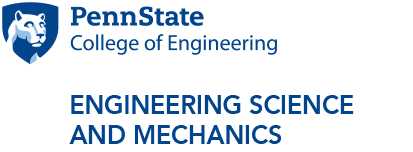Minors
Minor in Engineering Mechanics
The Department of Engineering Science and Mechanics (ESM) offers an Engineering Mechanics minor to undergraduates who wish to supplement their engineering backgrounds with extensive study in mechanics. The high-tech industry has a significant need for individuals with a sound background in engineering mechanics. Industries such as aerospace, automotive, power, structures, and appliance regularly hire graduates who are competent in engineering mechanics.
Engineering mechanics is the engineering science that deals with the effects of forces and torques on particles, rigid bodies, or deformable media. Mechanics is typically subdivided into statics, dynamics, and mechanics of deformable bodies.
Statics considers the algebra of vectors, equilibrium, equivalency of force/torque systems, and the concept of the free-body diagram. Special topics include friction, machines, and trusses.
Dynamics treats the motion resulting from unequilibrated force/torque systems through the study of acceleration, velocity, and displacement. An important special topic is simple harmonic motion, caused by a restoring force that is linearly dependent on displacement—this topic is the foundation of vibrations. Newton’s laws and energy principles form the basis of dynamics.
Mechanics of Deformable Materials covers the internal distribution of force per unit area (stress), local normalized deformation (strain), and material response (strain, strain rate) to stress and temperature. Failure criteria are introduced, as is design.
Program Requirements
- Complete at least 18 credits in engineering mechanics courses
- Take a minimum of 6 credits at the 400 level
- Achieve a grade of “C” or better in each E MCH course counted towards the 18-credit minimum
Engineering Mechanics Courses
The following list of courses is provided to assist students in selecting courses to satisfy the Engineering Mechanics minor requirements.
Statics:
- EMCH 210: STATICS AND STRENGTH OF MATERIALS (5 credits)
- EMCH 210H: STATICS AND STRENGTH OF MATERIALS, HONORS (5 credits)
- EMCH 211: STATICS (3 credits)
Dynamics:
- EMCH 212: DYNAMICS (3 credits)
- EMCH 212H: DYNAMICS, HONORS (3 credits)
- EMCH 409: ADVANCED MECHANICS (3 credits)
- EMCH 470: ANALYSIS AND DESIGN IN VIBRATION ENGINEERING (3 credits)
- EMCH 528: EXPERIMENTAL METHODS IN VIBRATIONS (3 credits)
Mechanics of Deformable Materials:
- EMCH 210: STATICS AND STRENGTH OF MATERIALS (5 credits)
- EMCH 210H: STATICS AND STRENGTH OF MATERIALS, HONORS (5 credits)
- EMCH 213: STRENGTH OF MATERIALS (3 credits)
- EMCH 315: MECHANICAL RESPONSE OF ENGINEERING MATERIALS (2 credits)
- EMCH 316: EXPERIMENTAL DETERMINATION OF MECHANICAL RESPONSE OF MATERIALS (1 credit)
- EMCH 400: ADVANCED STRENGTH OF MATERIALS AND DESIGN (3 credits)
- EMCH 402: APPLIED AND EXPERIMENTAL STRESS ANALYSIS (3 credits)
- EMCH 403: STRENGTH DESIGN IN MATERIALS AND STRUCTURES (4 crediits)
- EMCH 440: NONDESTRUCTIVE EVALUATION OF FLAWS (3 credits)
- EMCH 446: MECHANICS OF VISCOELASTIC MATERIALS (3 credits)
- EMCH 471: ENGINEERING COMPOSITE MATERIALS (3 credits)
- EMCH 473/AERSP 473: COMPOSITES PROCESSING (3 credits)
Numerical Methods/Computer Applications:
- EMCH 407: COMPUTER METHODS IN ENGINEERING DESIGN (3 credits)
- EMCH 461/ME 461: FINITE ELEMENTS IN ENGINEERING (3 credits)
Admission Requirements
- Applicants wishing to enroll in the Engineering Mechanics minor should have completed a background course in mathematics (MATH 250 or 251) and physics (PHYS 211)
- Present an acceptable schedule for completion of requirements
- Have a 2.50 grade-point average at the time of application
Application Procedure
To apply for the Engineering Mechanics minor, students must apply through LionPATH.
For more information about the Engineering Mechanics minor, please contact:
Mark W. Horn, Ph.D.
Nanotechnology Minor Coordinator
212 Earth and Engineering Sciences Building
814-865-0332
mwh4@psu.edu
Minor in Nanotechnology
Nanotechnology is already impacting a broad spectrum of human endeavors, from medicine and catalysis to textiles and quantum computing. Nanotechnology is inherently interdisciplinary and bridges across physics, biology, materials science, and chemistry. It is a general purpose, enabling technology.
The Nanotechnology minor is designed to help prepare students from a broad range of disciplines for careers or graduate study in fields involving nanotechnology. The minor builds upon the strengths of Penn State's faculty, expertise, academic programs, and nanofabrication facilities, including its class 1 and class 10 cleanrooms. The curriculum provides students with fundamental knowledge and skills in nanoscale simulation, design, syntheses, characterization, properties, processing, manufacturing, and applications.
In addition to preparing students for career opportunities in a diverse variety of fields such as microelectronics, information storage, optoelectronics, pharmaceuticals, agriculture, and medicine, the minor also prepares undergraduate students for exciting research opportunities and multidisciplinary nanotechnology-based advanced degree programs in graduate schools around the world. Interested third- and fourth-year undergraduate students in engineering, the chemical, physical, or biological sciences, medicine, and life or agricultural sciences are encouraged to enroll.
Students in the minor are encouraged to develop this interdisciplinary approach to science and engineering and to choose the required 18 credits of the minor accordingly. Students must take two prescribed courses (6 credits) in nanoscience fundamentals, and then select four additional courses (12 credits) from a growing list of interdisciplinary courses.
Program Requirements
- Complete at least 18 credits in approved nanotechnology courses
- Take E SC 312 and E SC 313
- Take a minimum of 6 credits at the 400 level
- Achieve a grade of "C" or better in each course counted toward the 18-credit minimum
Supporting Courses
- CHE 340: INTRODUCTION TO BIOIMOLECULAR ENGINEERING (3 credits)
- ESC 419: ELECTRONIIC PROPERTIES AND APPLICATIONS OF MATERIALS (3 credits)
- ESC 481: ELEMENTS OF NANO/MICRO-ELECTROMECHANIIAL SYSTEMS PROCESSING AND DESIGN (3 credits)
- ESC 482: MICROOPTOELECTROMECHANICAL SYSTEMS (MOEMS) AND NANOPHOTONICS (3 credits)
- ESC 483: SIMULATION AND DESIGN OF NANOSTRUCTURES (3 credits)
- ESC 484: BIIOLOGICALLY INSPIRED NANOMATERIALS (3 credits)
For more information about the Nanotechnology minor, please contact:
Mark W. Horn, Ph.D.
Nanotechnology Minor Coordinator
212 Earth and Engineering Sciences Building
814-865-0332
mwh4@psu.edu





